Bills for 4-year terms in advance in Senate
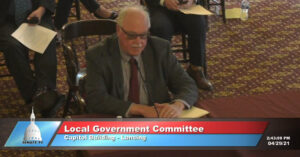 The Senate Local Government Committee advanced legislation to enact four-year terms for county commissioners at a Thursday hearing where Allegan County Commissioner Jim Storey and Dickinson County’s Joe Stevens testified in support of the bills.
The Senate Local Government Committee advanced legislation to enact four-year terms for county commissioners at a Thursday hearing where Allegan County Commissioner Jim Storey and Dickinson County’s Joe Stevens testified in support of the bills.
Senate Bill 242, by Sen. Ed McBroom (R-Dickinson), and SB 245, by Sen. Jeremy Moss (D-Oakland) would bring four-year terms to Michigan in the 2024 presidential election cycle. Enactment of these bills would end Michigan’s status as one of just five states with two-year terms on all commissioners.
In his testimony, Storey said, “In short, county commissioners are responsible for overseeing county governments whose job is service delivery, every day of every week of every month of every year. Being distracted from this service delivery, not legislative, function by short elected terms disserves the residents we share.”
The bills now move to the Senate floor.
MAC continues to encourage commissioners to add their voices to the four-year term effort. As of Thursday afternoon, 54 county leaders had responded. Please add your voice to this effort today by clicking here.
MAC also requests that counties adopt official resolutions of support for the legislation. To download a template for this purpose, click here.
As of Thursday, the following counties had advised MAC of passage of such resolutions: Genesee, Cheboygan, Bay, Ionia, Manistee, Van Buren, Clinton, Houghton, Marquette, Allegan, Newaygo, Emmet, Ontonagon and Wexford. If your county passes a resolution, please send a copy to Hannah Sweeney at sweeney@micounties.org.
For more information on this issue, contact Deena Bosworth at bosworth@micounties.org.
Governor announces COVID reopening benchmarks
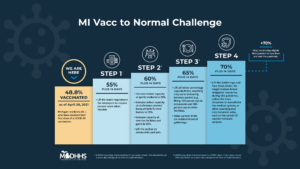 Michigan’s COVID restrictions would recede as the state hits various vaccination benchmarks under a plan unveiled by Gov. Gretchen Whitmer on Thursday.
Michigan’s COVID restrictions would recede as the state hits various vaccination benchmarks under a plan unveiled by Gov. Gretchen Whitmer on Thursday.
Her “MI Vacc to Normal” plan has four phases tied to statewide vaccination rates, with provisions kicking in two weeks after the benchmark is hit:
- 55% of Michiganders (4,453,304 residents) — allows in-person work for all sectors of business.
- 60% of Michiganders (4,858,150 residents) — increases indoor capacity at variety of venues and lifts curfew on restaurants and bars
- 65% of Michiganders (5,262,996 residents) — lifts all indoor % capacity limits, requiring only social distancing between parties and further relaxes limits on residential social gatherings.
- 70% of Michiganders (5,667,842 residents) — lifts the Gatherings and Face Masks Order such that MDHHS will no longer employ broad mitigation measures, unless unanticipated circumstances arise, such as the spread of vaccine-resistant variants
“The MI Vacc to Normal challenge outlines steps we can take to emerge from this pandemic as we hit our vaccination targets together,” said Governor Gretchen Whitmer. “On our path to vaccinating 70% of Michiganders 16 and up, we can take steps to gradually get back to normal while keeping people safe. “
For the latest information on COVID, visit MAC’s COVID Resources Page.
Legislative Conference highlights 4-year terms, federal COVID aid
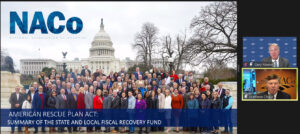 The top official in the Michigan House of Representatives signaled support for four-year county commissioner terms and critical federal guidance on how to spend $1.9 billion in COVID aid for Michigan counties is expected as early as next week were two of the highlights of the 2021 Michigan Counties Legislative Conference this week.
The top official in the Michigan House of Representatives signaled support for four-year county commissioner terms and critical federal guidance on how to spend $1.9 billion in COVID aid for Michigan counties is expected as early as next week were two of the highlights of the 2021 Michigan Counties Legislative Conference this week.
The gathering, held virtually for the second consecutive year, featured three plenary sessions plus more than a dozen workshops for MAC members and members of the Michigan County Medical Care Facilities Council (MCMCFC).
House Speaker Jason Wentworth (R-Clare), speaking during a recorded Legislative Roundtable, said he would support four-year terms for county commissioners. Legislation to enact such terms are now in the Michigan Senate and are a MAC legislative priority for 2021.
During a Thursday plenary session, Matt Chase, executive director of the National Association of Counties (NACo), said the U.S. Treasury may release guidance as early as next week on how counties can spend direct investments from the federal American Rescue Plan (ARP). Chase and NACo President Judge Gary Moore of Boone County, Ky., urged counties to be sure to have all of their technical requirements fulfilled to receive their first allotment of ARP funds.
Following Chase and Moore, MAC Executive Director Stephan Currie introduced the first graduating class of MAC’s County Commissioner Academy. Members are:
| Mary Ellen Babcock, Huron County | Teri Freehling, Berrien County |
| Vaughn Begick, Bay County | Bryan Kolk, Newaygo County |
| Ed Boettcher, Antrim County | Charles MacInnis, Emmet County |
| Joe Bonovetz, Gogebic County | Roseann Marchetti, Cass County |
| Mike Chappell, Van Buren County | William Miller, Oakland County |
| Toni Drier, Emmet County |
Currie also announced at the conference that MAC plans to return to in-person events with the 2021 Regional Summits in late July and the 2021 Annual Conference Sept. 26-28 on Mackinac Island.
Watch for registration alerts for these events starting in early June.
Supplemental budget bill spending $3.5 billion goes to full House
 An FY21 supplemental budget bill, House Bill 4420, by Rep. Thomas Albert (R-Kent), passed out of the House Appropriations Committee this week, allocating $2.5 billion in federal COVID relief funds and $992.3 million from the state’s General Fund. Included in that amount are:
An FY21 supplemental budget bill, House Bill 4420, by Rep. Thomas Albert (R-Kent), passed out of the House Appropriations Committee this week, allocating $2.5 billion in federal COVID relief funds and $992.3 million from the state’s General Fund. Included in that amount are:
- $25 million for PFAS remediation grants, $15 million of which is for municipal airports
- $40 million for high-water infrastructure grants to plan for severe weather impact and grants to address flooding, erosion and other coastal issues
- $300 million for the local road and bridge fund
- $400 million in return-to-work grants, which is for $1,000 each per person who returns to work and leaves the unemployment system
- $100 million in nursing facility grants to provide a $20 per Medicaid day increase to facilities that have experienced a decline in their average daily census
- $100 million for grants to increase the number of long-term pediatric psychiatric inpatient facilities ($85 million for a new Hawthorn center; $15 million for mental health care improvements in emergency rooms
- $19.8 million to meet new requirements of the federal Family First Prevention Services Act
- $6.5 million for Certified Community Behavioral Health Clinics Demonstration Program
- $7.5 million to support public access, through a website, to documents and digital images of documents filed in courts
The bill will be up for consideration in the full House next week. If approved, it would move to the Senate.
For questions on this issue, contact Deena Bosworth at bosworth@micounties.org.
MAC-opposed court mandates bill advances

Despite opposition from MAC, the Michigan Association of County Clerks and other stakeholders, House Bill 4164, by Rep. Ryan Berman (R-Oakland), passed the House 61-49 this week. The bill would require a court to allow the public to access, through a website, the register of documents and digital images of documents filed in that court by Jan. 1, 2023.
Currently, the state, through the State Court Administrative Office (SCAO), is moving toward a MiFILE system for electronic filings, but it is not expected to be done by 2023. In fact, the soonest SCAO has said it could be done, if funded properly, is 2025. The House supplemental funding plan does include $7.5 million toward this effort, but that bill is not finalized. Nor does HB 4164 ensure any local court costs are covered by the state, rather than their local funding unit.
The bill now moves to the Senate Judiciary and Public Safety Committee, chaired by Sen. Roger Victory (R-Ottawa). MAC urges members to use our Advocacy Center to reach out to your senators and also rally opposition from your county clerks, chief judges and their staffs.
For questions, please contact Meghann Keit-Corrion at keit@micounties.org.
Legislation to waive food safety fees advances in Senate
 Legislation that would impair funding for local health departments to ensure safe food establishments cleared the Senate Regulatory Reform Committee this week, despite opposition from MAC and the Michigan Association of Local Public Health.
Legislation that would impair funding for local health departments to ensure safe food establishments cleared the Senate Regulatory Reform Committee this week, despite opposition from MAC and the Michigan Association of Local Public Health.
Senate Bills 353-54, by Sen. Curt VanderWall (R-Benzie), would waive annual state and local licensing and application fees for food establishments from May 1, 2021, to April 2022.
MAC raised concern with the introduced version that waived the fees that are due by April 30, arguing most business owners would have already paid these fees by the time this legislation passed. MAC offered solutions in which restaurants could seek reimbursements through the state, while holding local health departments harmless, however the solution was not accepted.
Under the committee-passed version, to the extent that the Department of Agriculture and Rural Development (MDARD) or a local health department had charged and collected a license fee for a food service establishment license that was valid for the above license year, MDARD or the local health department would have to refund the license fee.
MAC strongly opposes as food service license fees cover 50 percent to 75 percent of the cost of food safety activities at the local level. While some counties may choose to waive the local fee, they do so because their budget can sustain it and they can replace the lost revenue. Others may not be so fortunate and should not be told by the state how to control their county budgets.
In a time when our county public health officials and staff have been under so much pressure responding to COVID, while continuing to manage a host of other responsibilities, this is not the time to reduce their revenue levels with no state funds to backfill them.
A better way to aid financially troubled restaurants, MAC and others argue, is found in the newly reopened Restaurant Revitalization Fund, operated by the federal Small Business Administration.
This COVID relief fund will again be accepting online applications starting May 3.
Please share this link with any eateries in your county that need assistance.
For more information on this issue, contact Meghann Keit-Corrion at keit@micounties.org.
Podcast 83 resumes live sessions on Monday, May 3
 After a one-week hiatus for the Legislative Conference, MAC’s Podcast 83 team returns to the web on Monday, May 3 to discuss legislative action in Lansing and Washington, D.C.
After a one-week hiatus for the Legislative Conference, MAC’s Podcast 83 team returns to the web on Monday, May 3 to discuss legislative action in Lansing and Washington, D.C.
To register for the live event, which starts at 3 p.m., click here.
Links to past episodes can be found on the podcast webpage, while every 2021 video episode is now available on MAC’s YouTube channel.
Mental health agencies launch advocacy campaign
 The Community Mental Health Association of Michigan (CMHAM) issued an advocacy tool to voice opposition and caution to a proposal in the Michigan Senate “that would once again take up physical health/behavioral health integration.
The Community Mental Health Association of Michigan (CMHAM) issued an advocacy tool to voice opposition and caution to a proposal in the Michigan Senate “that would once again take up physical health/behavioral health integration.
“Much like the 298 process from a couple years ago,” CMHAM wrote, “this new proposal would shift the Medicaid financing and managed care functions from the public PIHP system to private Medicaid Health Plans. We once again have significant concerns with this type of proposal, which we have shared directly with Senate Majority Leader Mike Shirkey’s office – integration MUST begin and focus at the patient level on the ground not at the financial level and there MUST be public accountability / public governance in order to protect Michigan’s most vulnerable citizens.”
MAC continues to support a public mental health system, which gives local control and oversight to our counties to ensure quality and accessible services for all residents.
County leaders can also use this advocacy tool and share it with colleagues and community members. Members are encouraged to speak to your legislators before these bills get introduced and ask that they revisit the Section 298 Workgroup Final Report recommendations and OPPOSE any integration plan that does not include key recommendations: MUST have public governance and MUST be integrated at the point of service delivery not financial integration for individuals on the Medicaid program.
Click this link to log in and send your message.
Sample proclamation offered for Public Health Week
 Counties are encouraged to pass proclamations in support of Michigan Public Health Week, which will be May 9-15 this year.
Counties are encouraged to pass proclamations in support of Michigan Public Health Week, which will be May 9-15 this year.
MAC is part of an alliance of groups and agencies that sponsor the Home Hometown Health Hero awards each year. Recipients of the award are usually honored during Public Health Week.
As we all know, COVID has put a huge strain on the entire health field, with local public health staffs facing the added complication of being in charge of health orders and activities that have angered some Michigan residents.
A sample proclamation is here for counties who wish to add their voice of support to these public servants working on our behalf.
For more information on Michigan Public Health Week, click here.
Join NACo for Trivia and Networking Night on May 6
 The National Association of Counties (NACo) is excited to announce a new series of virtual trivia and networking nights, which will take place on a regional basis between now and the NACo Annual Conference in July. Connect with colleagues from your region, receive a special gift from NACo – and compete for the title of County Trivia Champion.
The National Association of Counties (NACo) is excited to announce a new series of virtual trivia and networking nights, which will take place on a regional basis between now and the NACo Annual Conference in July. Connect with colleagues from your region, receive a special gift from NACo – and compete for the title of County Trivia Champion.
Join us for the Central and Upper Midwest Regional Trivia and Networking Night on Thursday, May 6 at 5:30 p.m. EDT/4:30 p.m. CDT. Additional details and the registration link are below.
Michigan county leaders will compete against colleagues from Illinois, Indiana, Kentucky, Minnesota, Ohio and Wisconsin.
- How will this work? Attendees who register will receive a Zoom link. Teams will be assigned randomly and sent into breakout rooms to answer three rounds of questions. The team with the most points wins.
- Can I invite other county officials? NACo members and county staff from the states listed above are invited to this event. Please feel free to share with your colleagues or county staff.
- How long will the event last? Teams will compete over three rounds of trivia that will include seven to eight questions each. The total event will last one hour.
 Staff picks
Staff picks
- Where states get their money (Pew Trusts)
- Which state is the greenest, most environmentally friendly? (Governing)
- Legislative Oversight Capacity by State (Wayne State University)
- Does the federal housing policy do enough to stop evictions? (Governing)
 Are you starting to feel like the hardest part of the global pandemic may be behind us? As vaccines begin rolling out around the world and glimpses of normal life start returning, we’ve been wondering what impact all of these changes might be having on people’s wellbeing.
Are you starting to feel like the hardest part of the global pandemic may be behind us? As vaccines begin rolling out around the world and glimpses of normal life start returning, we’ve been wondering what impact all of these changes might be having on people’s wellbeing.
So, this spring, researchers at The Wellbeing Lab headed out into Michigan to measure the well-being of 1,500 people representative of Michiganders to ask, “How are we doing” and delved into how people were boosting their levels of thriving and reducing their levels of struggle at this time. Survey data shows valuable forms of wellbeing support their families and community had been providing and what actions their workplaces and bosses were taking that were having a positive impact.
Want to know what was found?
Join us for a special event for our members, where Louis Alloro of The Wellbeing Lab will give highlights of the 2021 Michigan Community Wellbeing Report. Discover the roles struggle, psychological safety, families, allyship and vaccinations have played in helping people care for their well-being, and the practices you can implement in your own community. And we will discuss ways of intelligently applying these findings as a network.
Use this link on May 11 at 10:30 a.m. to enter the webinar.
Louis Alloro is social entrepreneur creating and facilitating highly sought after, evidence-based learning experiences helping teams and entire organizations and communities dig deeper and reach higher, thereby creating a collective impact. Since 2018, he’s collaborated with the Michelle McQuaid group in creating content for The Change Lab and The Wellbeing Lab. Since 2008, he has trained and certifies thousands of practitioners, companies and communities in applied positive psychology and wellbeing science, including cohorts from Midland, Mich., who he helped form a regional Wellbeing Coalition.
Legislature attaches strings to FY22 revenue sharing funds
 As the Legislature advanced budget bills this week, differences between the House and Senate are injecting some uncertainty into county revenue sharing for fiscal 2022, which starts Oct. 1.
As the Legislature advanced budget bills this week, differences between the House and Senate are injecting some uncertainty into county revenue sharing for fiscal 2022, which starts Oct. 1.
The Senate advanced a 2 percent increase, which is in line with what Gov. Gretchen Whitmer proposed earlier this year, but with a requirement that “any county with a retirement benefit system that was in underfunded status must dedicate any County Revenue Sharing increase to that system.”
The House, however, is recommending only a 1 percent increase, and ties the boost to a requirement “to maintain public safety expenditures at an amount not less than FY 2020-21 amount to qualify for a payment.” The House also has an underfunded retirement system restriction.
Any amount below a 2 percent increase would be a disappointment for Michigan counties, especially in light of the billions of dollars now available to the state. And MAC will strongly oppose any bid by legislators to attach strings to revenue sharing funds, which are, by definition, supposed to be for the general use of counties.
MAC urges members to call their legislators (follow links below to phone lists) and share their opposition to efforts to restrict revenue sharing dollars.
Budget bills were passed out of appropriations subcommittees in each chamber largely on party-line votes. In a twist, under House proposals, funding for many state agencies would be done on a quarterly basis, rather than the typical full-year budget. The House Appropriations chair, Rep. Thomas Albert (R-Ionia) explained, “This change ensures more accountability, efficiency and transparency by building it right into the system four times a year through legislative review.”
Other budget items advanced with significant effects for counties include:
- $14.8 million for county jail reimbursement program (House and Senate versions)
- $5 million for COVID-19 reimbursement for county jails for housing prisoners (House)
- $51.4 million for essential local public health (House); Senate version is $56.4 million
- $36 million allocation of federal state opioid response grants (House and Senate)
- $265 million for the Child Care Fund (House); Senate version is $229 million
- $3.5 million for county indirect cost allotments (House and Senate)
- $9.1 million for the Raise the Age Fund for implementation and non-eligible CCF items (House); Senate version is $14 million
- $26.5 million to fund a certified community behavioral health clinics demonstration program (House and Senate)
- $4 million for county veteran service fund grants (House and Senate)
- $12.9 million for secondary road patrol program (House and Senate)
- $10.1 million to phase out local CMH drawdown on Medicaid (Senate)
If you have questions about the FY22 budget, please email them to Hannah Sweeney at sweeney@micounties.org.
Legislative Conference starts next week; registration closes April 26
 The first plenary session of the 2021 Michigan Counties Legislative Conference is now less than a week away. County leaders, however, still have time to register for the virtual event April 28-29, as registration remains open until 5 p.m. on April 26.
The first plenary session of the 2021 Michigan Counties Legislative Conference is now less than a week away. County leaders, however, still have time to register for the virtual event April 28-29, as registration remains open until 5 p.m. on April 26.
The conference will feature:
- More than a dozen workshops for members of MAC and the Michigan County Medical Care Facilities Council (MCMCFC)
- Three plenary sessions that will feature a Legislative Roundtable, presentations by the National Association of Counties and the first “graduation ceremony” for MAC’s County Commissioner Academy
Please make note of a late change to the program:
The workshop on Michigan planning organizations, originally scheduled for Thursday morning, has been canceled. Those who had planned to attend that event will be redistributed into the other two workshops during the Thursday morning pod. MAC apologies for any inconvenience
MAC and MCMCFC appreciate the support of conference sponsors.
What’s the latest on federal funds?
 While specific spending guidance has not been released, the first batch of funds from the $65 billion in direct federal investment in counties is expected to arrive in county accounts “around May 10th or so,” said NACo Executive Director Matt Chase during a membership call on Thursday afternoon.
While specific spending guidance has not been released, the first batch of funds from the $65 billion in direct federal investment in counties is expected to arrive in county accounts “around May 10th or so,” said NACo Executive Director Matt Chase during a membership call on Thursday afternoon.
In other key points during the call, Chase noted:
- “We still aren’t 100 percent sure when the first round of (spending) guidance will be out … though we are thinking late April to early May.”
- If your county has multiple DUNS numbers, figure out which one is for your general purpose fund. And note your preferred account. If you have multiple accounts, it is up to you (the county) to advise Treasury on which is the correct one for the deposit.
- Make sure your SAM registration is active.
The Michigan Department of Treasury issued the following advisory this week:
“Under the American Rescue Plan Act of 2021 (ARPA), the U.S. Department of Treasury has established three classifications for local governments – metropolitan cities, counties, and non-entitlement communities. Metropolitan cities are defined by the Housing Community Development Act of 1974. Non-entitlement communities are generally local governments other than counties and metropolitan cities.
“Metropolitan cities and counties will receive their federal ARPA payments directly from the U.S. Department of Treasury, while non-entitlement communities will receive their payments through the state of Michigan.
“On April 15, 2021, the U.S. Department of Treasury announced pre-award requirements for metropolitan cities and counties. While this guidance focuses on metropolitan cities and counties, non-entitlement communities are expected to provide the same information, which includes a DUNS number and a SAM registration.
“Many of Michigan’s local governments have already set up this information for the state-level CARES Act programs administered last year, which included the Coronavirus Relief Local Government Grants Program (CRLGG), First Responder Hazard Pay Premiums Program (FRHPPP), and Public Safety and Public Health Payroll Reimbursement Program (PSPHPR).
“Local governments must renew their SAM registration annually to maintain an ‘active status,’ which designates an entity as eligible to receive federal financial assistance. Additional information on this topic is available on the U.S. Department of Treasury’s Coronavirus State and Local Fiscal Recovery Fund webpage.
The Michigan Treasury Department is encouraging local governments to review tips about preparing for the use of ARPA dollars by viewing Treasury’s “Planning for the Use of the American Rescue Plan Act” memo. This information will assist local governments as they prepare to use this funding most effectively.
Materials Management package passes House
 An eight-bill, bipartisan package rewriting the section of the Natural Resources and Environmental Protection Act that governs solid waste planning was passed by the House this week. A significant amount of time, dedication and work has gone into this package by all of the stakeholders and the product that they voted out was based on an overall consensus. Not everyone is happy with the entire package, and there are a few issues that still need to be ironed out but the package is a modernization of the statute which reflects an emphasis on materials management, sustainable disposal of waste and additional environmental protections.
An eight-bill, bipartisan package rewriting the section of the Natural Resources and Environmental Protection Act that governs solid waste planning was passed by the House this week. A significant amount of time, dedication and work has gone into this package by all of the stakeholders and the product that they voted out was based on an overall consensus. Not everyone is happy with the entire package, and there are a few issues that still need to be ironed out but the package is a modernization of the statute which reflects an emphasis on materials management, sustainable disposal of waste and additional environmental protections.
MAC supports House Bills 4454-61 in concept, with just a few, but significant reservations.
The reservations MAC has is not so much about the goals, the protections or the regulations, but with the challenges the planning agencies will face with regard to the process for writing and adopting the materials management plan. The three-year process includes a significant level of outreach, communication, coordination, research, negotiation, scientific expertise, approvals, amendments and eventually implementation. It is an inclusive, necessary process but one that will require resources that will likely exceed the allocation proposed in the legislation. We will know the full extent of the costs or challenges until the process gets under way.
Nonetheless MAC would be remiss if we did not express concern over the costly and time-consuming process necessary to achieve plan development let alone the additional expenses likely to be incurred in the achievement of the recycling goals set forth in the bills. Although it is the right thing to do for our planet, our future generations and our communities, the financial return on investment is, in many cases, a deterrent.
For additional details on this package, click here.
MAC still needs your voice on 4-year terms legislation
 MAC continues to wait on word from the Senate Local Government Committee about the first hearings for bipartisan legislation to enact four-year terms for county commissioners.
MAC continues to wait on word from the Senate Local Government Committee about the first hearings for bipartisan legislation to enact four-year terms for county commissioners.
Senate Bill 242, by Sen. Ed McBroom (R-Dickinson), and SB 245, by Sen. Jeremy Moss (D-Oakland) would bring four-year terms to Michigan in the 2024 presidential election cycle. Passage of these bills would end Michigan’s status as one of just five states with two-year terms on all commissioners.
To date, 48 commissioners have utilized the email system; up from last week, but still not nearly enough to get the Senate’s full attention. Please add your voice to this effort today by clicking here.
MAC also requests that counties adopt official resolutions of support for the legislation. To download a template for this purpose, click here.
As of Friday morning, MAC was aware of 11 counties with 4-year term resolutions in 2021: Allegan, Bay, Cheboygan, Clinton, Emmet, Genesee, Houghton, Marquette, Newaygo, Ontonagon and Wexford. (with map)
When your county passes such a resolution, please send a copy to Hannah Sweeney at sweeney@micounties.org.
Check out past podcast episodes on YouTube
 Every video episode of MAC’s Podcast 83 is now available on MAC’s YouTube channel, including the April 19 live session in which MAC’s Stephan Currie, Deena Bosworth and Meghann Keit discussed state budget news for fiscal 2022.
Every video episode of MAC’s Podcast 83 is now available on MAC’s YouTube channel, including the April 19 live session in which MAC’s Stephan Currie, Deena Bosworth and Meghann Keit discussed state budget news for fiscal 2022.
While you are catching up on your podcast viewing, please note the team is taking a hiatus for April 26 to prepare for the Michigan Counties Legislative Conference April 28-29.
The next live episode of Podcast 83 is expected on Monday, May 3 at 3 p.m. Check next Friday’s Legislative Update email for registration information.
Funding for MIDC grants advances in budget process
 Funding for the Michigan Indigent Defense Commission (MIDC) grants to counties moved from House and Senate subcommittees this week with $148.9 million recommended, a figure in line with the governor’s proposal.
Funding for the Michigan Indigent Defense Commission (MIDC) grants to counties moved from House and Senate subcommittees this week with $148.9 million recommended, a figure in line with the governor’s proposal.
However, the House plan had an ironic spin on the funds, as they cover the new Standard 5, which requires independence from the judiciary, and moves the entirety of the MIDC budget under the judicial branch. Under current state law (MIDC Act), the commission is under the Department of Licensing and Regulatory Affairs (LARA). In the original version of the MIDC Act, passed in 2013, the commission was housed within the judicial branch, but that changed in 2016 after the Michigan Supreme Court noted the uncertain constitutionality of the 2013 act, all of which involve the potential for interference with constitutional provisions pertaining to the separation of powers between branches of government.
State law would have to be changed to implement this budget recommendation this year, and Chair Jeff Yaroch (R-Macomb) of the LARA Appropriations Subcommittee explained to committee members that the debate would take place on the location of the money through the process of changing the law. Chair Sarah Lightner (R-Jackson) of the Judiciary Appropriations Subcommittee said she felt it was a better fit under this budget and Chair Yaroch concurred.
In other MIDC news, the commission met this week and approved a sticking point in the Wayne County FY 21 proposal. After going through the statutory mediation process over dispute of funds for the counties new jail complex to comply with Standard 2 which requires private and confidential meeting space for defense counsel and their client. The commission approved the mediator’s recommendation to a fund $2.3 million of the requested $4.9 million.
The commission also heard from the Lansing research firm of Public Sector Consultants on its local share interim report, which is required under statute and due by October 2021. The consultants will be convening focus groups and developing further recommendations and updates for a final report to the commission in upcoming months.
For more information on this issue, contact Meghann Keit-Corrion at keit@micounties.org.
Governor forms new jails panel; Alpena’s Peterson appointed
 A new jail reform panel, which will build on work of a 2019 highly successful county-state joint task force, was formed this week by Gov. Gretchen Whitmer.
A new jail reform panel, which will build on work of a 2019 highly successful county-state joint task force, was formed this week by Gov. Gretchen Whitmer.
“The Jail Reform Advisory Council will play a critical role in implementing long overdue reforms to our justice system,” Whitmer said in a statement. “Michigan will continue to lead the way as we take tangible steps to reform our justice system, and I know that the bipartisan work of this council will make our communities and state safer, save taxpayer dollars and help us achieve the goals laid out by the Task Force on Jail and Pretrial Incarceration.”
Among appointees to the panel are Bill Peterson, an Alpena County commissioner and owner and operator of Twin Acres 19th Hole restaurant. He is appointed to represent a member of a board of county commissioners for a term expiring March 31, 2023.
Peterson was one of two MAC-recommended appointees to the 2019 panel that drafted a series of recommendations that were codified during the last legislative session.
Other county officials on the new panel are Washtenaw County Sheriff Jerry Clayton, Oakland County Community Corrections Division Manager Barbara Hankey and Muskegon County Prosecutor D.J. Hilson.
MAC resuming print production of Michigan Counties magazine
Michigan Counties April 2021 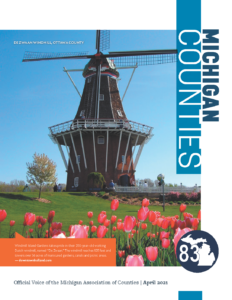 After a decade-long hiatus, print copies of MAC’s bimonthly magazine, Michigan Counties, will soon be arriving in county mailboxes around Michigan.
After a decade-long hiatus, print copies of MAC’s bimonthly magazine, Michigan Counties, will soon be arriving in county mailboxes around Michigan.
For many years, our bimonthly magazine was printed and mailed to county leaders across our state. About a decade ago, we halted printing as one of many cost-saving measures taken at MAC to allow us to keep member dues frozen during the depths of the Great Recession.
“Thanks to our continuing efforts to diversify our revenue streams, and the improving nature of Michigan’s economy, we made the decision this year to return Michigan Counties to print,” announced Stephan Currie, MAC executive director.
Complimentary copies are now being mailed to the commissioners, administrators and board offices of all MAC member counties. Our state legislators also will receive copies, so keep an eye out for it the next time you visit your representative and senator in their Lansing offices.
A digital version of the magazine, released at the end of February, April, June, August, October and December each year, will still be available on the MAC website.
State announces $1M in grants for broadband expansion
 The state has released another $1 million in grant funding to extend broadband service in Michigan, with the newest funded projects slated for areas in the following counties: Berrien, Branch, Calhoun, Genesee, Kalamazoo, Shiawassee and St. Joseph.
The state has released another $1 million in grant funding to extend broadband service in Michigan, with the newest funded projects slated for areas in the following counties: Berrien, Branch, Calhoun, Genesee, Kalamazoo, Shiawassee and St. Joseph.
“This builds off the $11.9 million announced in November 2020,” said a Department of Technology, Management and Budget (DTMB) statement, “and will provide service to an additional 1,300 households, businesses and community anchor institutions (CAI) in Michigan. All projects have committed to closing the internet access divide and provide digital literacy training materials to residents and businesses in their proposed service area, and work with local CAIs and foundations to host events to promote e-learning, job, and workforce training.”
A third round of projects are currently under public review with DTMB accepting comment or objections concerning each project through May 5, 2021. Public Act 166 of 2020 requires that DMTB “receive a sworn statement from an internet service provider” to amend an initial grant award in areas “where construction of a network to provide broadband service is under way, and construction is scheduled to be completed within 1 year after the date of application,” as well areas that have received funding from the Federal Communication Commission (FCC) or the United States Department of Agriculture (USDA) “specifically for the expansion of broadband services. Review the CMIC 2.0 initial grant awards here.
For additional information about the CMIC Broadband Grant, visit www.michigan.gov/CMICGrant.
To learn more about the Connecting Michigan Task Force, visit https://www.michiganbusiness.org/broadband/.
 Staff picks
Staff picks
- Michigan offers new model for jail reform (Pew Trusts)
- Alternatives to juvenile justice probation growing in many states, report finds (Route Fifty)
- Drop off unwanted prescription drugs at April 24 (Oakland County) ‘Take Back Day’ (Oakland Press)
- Can rescue funds give America the broadband it really wants? (Governing)
U.S. Treasury releases initial guidance on American Rescue Plan aid
 On Thursday afternoon, the U.S. Treasury released its guidance on pre-award requirements, outlining immediate steps counties need to take to receive direct payments from the U.S. Treasury under the Coronavirus State and Local Fiscal Funds authorized by the American Rescue Plan Act, the National Association of Counties advised Thursday evening.
On Thursday afternoon, the U.S. Treasury released its guidance on pre-award requirements, outlining immediate steps counties need to take to receive direct payments from the U.S. Treasury under the Coronavirus State and Local Fiscal Funds authorized by the American Rescue Plan Act, the National Association of Counties advised Thursday evening.
As soon as possible, county governments should complete the steps below:
- Ensure the entity has a valid DUNS number. A DUNS number is a unique nine-character number used to identify an organization and is issued by Dun & Bradstreet. The federal government uses the DUNS number to track how federal money is allocated. A DUNS number is required prior to registering with the SAM database, which is outlined below. Registering for a DUNS number is free of charge. If an entity does not have a valid DUNS number, please visit https://fedgov.dnb.com/webform/ or call 1-866-705-5711 to begin the registration process.
- Ensure the entity has an active SAM registration. SAM is the official government-wide database to register with in order to do business with the U.S. government. All federal financial assistance recipients must register on SAM.gov and renew their SAM registration annually to maintain an active status to be eligible to receive federal financial assistance. There is no charge to register or maintain your entity SAM registration. If an entity does not have an active SAM registration, please visit, SAM.gov to begin the entity registration or renewal process. Please note that SAM registration can take up to three weeks; delay in registering in SAM could impact timely payment of funds. Click here for a quick overview for SAM registration.
- Gather the entity’s payment information, including:
- Entity Identification Number (EIN), name and contact information
- Name and title of an authorized representative of the entity
- Financial institution information (e.g., routing and account number, financial institution name and contact information)
To see county-by-county direct aid estimates to Michigan counties, click here.
Visit NACo’s COVID-19 Recovery Clearinghouse for timely resources, including allocation estimations, examples of county programs using federal coronavirus relief funds, the latest updates from the U.S. Department of Treasury and more.
For the latest county-related news in Michigan on COVID-19, visit MAC’s Resources Page.
Have you shared your voice about 4-year commissioner terms?
 As the Michigan Senate prepares to consider a bipartisan pair of bills to enact four-year terms for county commissioners, MAC continues to urge commissioners to send an email message of support to their senators via our digital advocacy platform.
As the Michigan Senate prepares to consider a bipartisan pair of bills to enact four-year terms for county commissioners, MAC continues to urge commissioners to send an email message of support to their senators via our digital advocacy platform.
To date, 29 commissioners have utilized the email system — not nearly enough to get the Senate’s full attention. Please add your voice to this effort today by clicking here.
MAC also requests that counties adopt official resolutions of support for the legislation. To download a template for this purpose, click here. After adoption, please send a copy of your resolution to sweeney@micounties.org.
MAC thanks the following counties for their recent adoption of such resolutions: Cheboygan, Clinton, Genesee, Houghton and Marquette.
Conference approaches; there’s still time to register
 The 2021 Michigan Counties Legislative Conference starts in less than two weeks, but you still have time to register for the two-day virtual event.
The 2021 Michigan Counties Legislative Conference starts in less than two weeks, but you still have time to register for the two-day virtual event.
Early-bird pricing has expired, but you can still gain access to all conference activities for a low member price of $125.
Among the numerous workshops being offered with practical advice for busy county leaders is a session on collective bargaining on the morning of Thursday, April 29, led by attorney Matt Nordfjord.
Nordfjord, a shareholder with the firm of Cohl, Stoker & Toskey P.C. and a regular presenter at MAC events, will give an overview of the changing landscape faced by governmental employers negotiating collective bargaining agreements. This presentation will cover strategy, examples from other counties and arguments you may expect from employee representatives.
To attend Nordfjord’s briefing and the rest of the conference, start your registration process here.
MAC and the Michigan County Medical Care Facilities Council appreciate the support of the sponsors listed below in providing this year’s Legislative Conference.
House declares April as ‘National County Government Month’
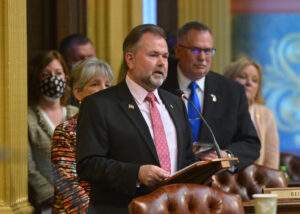
Rep. Ken Borton speaks on the House floor on HR 77, joined by (l-r): Rep. Julie Rogers, Rep. Terry Sabo, Rep. Sue Allor, Rep. David Martin and Rep. Julie Alexander.
A bipartisan group of state representatives, led by Rep. Ken Borton, a former president of the MAC Board of Directors, secured adoption on April 13 of a resolution declaring April National County Government Month in Michigan.
In remarks in support of the resolution, Borton told the House, “Never has the importance of county government – Michigan’s Original Regional Government – been more apparent than in the last year as we have battled the COVID pandemic. County health departments have worked diligently, sometimes in the most challenging circumstances, to share needed information, track cases and provide vaccinations to Michigan residents.”
House Resolution 77 notes, “”Resolved by the House of Representatives, that members of this legislative body declare April 2021 as County Government Month in the state of Michigan. We urge all citizens to observe the month with appropriate programs and activities.”
Joining Borton (R-Otsego) in sponsoring the resolution were: Rep. Abraham Aiyash (D-Wayne); Rep. Julie Alexander (R-Jackson); Rep. Sue Allor (R-Cheboygan); Rep. Sarah Anthony (D-Ingham); Rep. Robert Bezotte (R-Livingston); Rep. Felicia Brabec (D-Washtenaw); Rep. Kelly Breen (D-Oakland); Rep. Julie Calley (R-Ionia); Rep. John Cherry (D-Genesee); Rep. Alex Garza (D-Wayne); Rep. Beth Griffin (R-Van Buren); Rep. Jim Haadsma (D-Calhoun); Rep. Kara Hope (D-Ingham); Rep. Tullio Liberati (D-Wayne); Rep. Sarah Lightner (R-Jackson); Rep. Steve Marino (R-Macomb); Rep. Gregory Markkanen (R-Houghton); Rep. David Martin (R-Genesee); Rep. Christine Morse (D-Kalamazoo); Rep. Amos O’Neal (D-Saginaw); Rep. Ronnie Peterson (D-Washtenaw); Rep. Yousef Rabhi (D-Washtenaw); Rep. Julie Rogers (D-Kalamazoo); Rep. Terry Sabo (D-Muskegon); Rep. Tim Sneller (D-Genesee); Rep. William Sowerby (D-Macomb); and Rep. Regina Weiss (D-Oakland).
MAC has created a resources page for counties looking for ideas to promote their NCGM work. And we will be featuring #NCGM on our Twitter account and our Facebook page throughout April.
 Podcast 83 goes live again on Monday, April 19
Podcast 83 goes live again on Monday, April 19
The Podcast 83 team returns on Monday for another live session to report on activity in Lansing and Washington, D.C., that affects Michigan’s 83 county governments and the people they serve.
Click here to register for the live event, which will include a Q&A session on all of the hot legislative topics. The episode starts at 3 p.m. on Monday, April 19.
Members can view any previous episode of the podcast, sponsored by DTE Energy, on the podcast webpage.
Help MAC defeat court filing bill with unfunded mandates
 House Bill 4164, by Rep. Ryan Berman (R-Oakland) and now before the Michigan House, represents yet another unfunded mandate by the state on counties, this time by requiring courts to make the register of actions and “a digital image of all documents filed in any case in that court” accessible to the public for free via a website by Jan. 1, 2023.
House Bill 4164, by Rep. Ryan Berman (R-Oakland) and now before the Michigan House, represents yet another unfunded mandate by the state on counties, this time by requiring courts to make the register of actions and “a digital image of all documents filed in any case in that court” accessible to the public for free via a website by Jan. 1, 2023.
MAC and the Michigan Association of County Clerks opposed the original version, which only allowed online access for attorneys, and both groups remain opposed to the committee-passed version, which expanded it to the general public. There is no funding attached to the court technology enhancements and staffing needs that would be needed to meet the requirements under the bill, nor is the timeline adequate for counties and courts to implement.
The State Court Administrator’s Office also opposes the bill, arguing it is a separation of powers violation. Additionally, the state court administrator has previously explained the rollout of the MI-File system is under way, which makes the imposition of new, additional requirements right now particularly ill-advised.
Counties cannot endure another unfunded mandate or support a bill based on funding promises.
County commissioners, please use this link below to transmit your message of opposition to HB 4164 to your member of the Michigan House of Representatives as soon as possible.
MIOSHA extends emergency workplace rules on COVID
 Emergency rules governing workplaces in Michigan during COVID were extended to Oct. 14, 2021, the Michigan Occupational Safety and Health Administration (MIOSHA) announced this week.
Emergency rules governing workplaces in Michigan during COVID were extended to Oct. 14, 2021, the Michigan Occupational Safety and Health Administration (MIOSHA) announced this week.
The emergency rules require businesses that resume in-person work to have a written COVID-19 preparedness and response plan and provide thorough training to their employees that covers workplace infection-control practices, the proper use of personal protection equipment (PPE), steps workers must take to notify the business or operation of any symptoms of a suspected or confirmed diagnosis of COVID-19, and how to report unsafe working conditions.
Under the emergency rules, employers must continue to implement policies that require remote work for employees where remote work is feasible, to help ensure that COVID-19 transmission is mitigated to the maximum extent possible. While in-person work is permitted when remote work is not feasible, remote work is recommended as a strategy to minimize in-person contacts and is included in guidance from the CDC and Federal OSHA to protect employees in the workplace.
Employers and employees with questions regarding workplace safety and health may contact MIOSHA using the new hotline at 855-SAFE-C19 (855-723-3219). For more information, visit Michigan.gov/COVIDWorkplaceSafety.
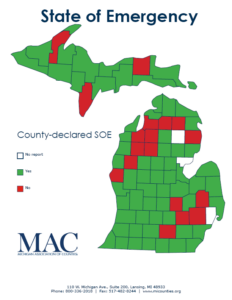 MAC continues to advise SOE resolutions for counties
MAC continues to advise SOE resolutions for counties
MAC continues to advise members to adopt and/or maintain a county State of Emergency on the COVID pandemic. This advice is based on the options that such an SOE provides for public board sessions under the state’s Open Meetings Act (OMA).
As of April 1, the only way for public boards to hold virtual sessions and properly comply with the OMA is with an SOE resolution. A template for such a resolution is on MAC’s COVID Resources Page.
Data collected by MAC in recent weeks show the vast majority of counties have adopted or are about to adopt an SOE that covers this need. (See map at right; click here for larger image.)
The option for meeting virtually under the OMA with an SOE expires on Dec. 31, 2021.
As always, county boards are advised to consult with their corporate counsel to ensure procedures are following all relevant state laws.
MSU Extension offers ‘County Café’ learning session in May
 County Café, a follow-up program to the MAC-MSUE New Commissioner School, is designed to bring together both experienced and new commissioners and county leadership; present some current topics of relevance to county government; and give you a chance to talk about how these topics might impact your county and actions you can take to make the impact more positive. There will also be an opportunity for discussion following the presentation.
County Café, a follow-up program to the MAC-MSUE New Commissioner School, is designed to bring together both experienced and new commissioners and county leadership; present some current topics of relevance to county government; and give you a chance to talk about how these topics might impact your county and actions you can take to make the impact more positive. There will also be an opportunity for discussion following the presentation.
This is a free session and open to all commissioners and other county officials, but you must register at the link below to participate.
May 6, 11 a.m.-12:30 p.m. EST – Counties Supporting Regional Economic Development
Counties are important economic development entities in Michigan. Yet successful economic development depends on collaboration, partnerships, and regional approaches. The MSU Economic Development Administration (EDA) University Center for Regional Economic Innovation (REI) leverages higher education assets in collaboration with communities to support the co-creation, co-implementation and dissemination of new and innovative economic development strategies.
To advance Michigan’s long-term economic recovery from COVID-19, REI was awarded CARES Act funding in summer 2020 to establish a Comprehensive Economic Recovery Initiative (CERI). Join Jennifer Bruen of the MSU REI to learn about CERI, technical assistance, and partnership opportunities to advance regional economic development in Michigan.
To register for the event, visit: https://events.anr.msu.edu/countycafe21/.
 Staff picks
Staff picks
- Court OKs law that carries more cash penalties for convicts (AP News)
- Churches are closing. It’s a challenge for local governments. (Governing)
- How states can avoid costly pitfalls while rebuilding their economies (Pew Research)
- Consider fostering a child (Alpena News)
Push begins for 4-year commissioner terms
 Initial hearings are possible next week in a Senate committee on a bipartisan pair of bills to enact four-year terms for county commissioners in Michigan.
Initial hearings are possible next week in a Senate committee on a bipartisan pair of bills to enact four-year terms for county commissioners in Michigan.
Senate Bill 242, by Sen. Ed McBroom (R-Dickinson), and SB 245, by Sen. Jeremy Moss (D-Oakland) would shift terms to four years, beginning with the 2024 presidential election cycle.
Through its policy platforms, MAC has long supported moving county commissioner terms to four years from the present two. Legislation to do this made good progress in 2020 but did not reach enactment.
Passage of these bills would end Michigan’s status as one of just five states with two-year terms on all commissioners. It’s time to end that dubious distinction and bring commissioner terms in alignment with the length of those for other county elected offices across our state.
The Senate bills are now before the Senate Committee on Local Government, chaired by Sen. Dale Zorn (R-Monroe).
“It’s important to make county voices numerous and loud as the Senate starts with these bills,” said MAC Governmental Affairs Director Deena Bosworth, “so we need members to help us now.”
First, MAC asks all commissioners to use our email advocacy tool on Monday, April 12 to send a message of support to senators. Commissioners will receive an email on Monday, through which they can send a pre-drafted message of support with just a couple of clicks.
Second, MAC asks county boards to approve a resolution in support of four-year terms. A template for this purpose can be on MAC’s website. MAC appreciates the early action of Genesee, Hillsdale and Marquette counties in adopting such resolutions. Once your county has approved the resolution, please send it to Hannah Sweeney at sweeney@micounties.org so that we can share with legislators.
For more information on this issue, contact Bosworth at bosworth@micounties.org.
 Podcast 83 goes live again on Monday, April 12
Podcast 83 goes live again on Monday, April 12
The Podcast 83 team returns on Monday for another live session to report on activity in Lansing and Washington, D.C., that affects Michigan’s 83 county governments and the people they serve.
Click here to register for the live event, which will include a Q&A session on all of the hot legislative topics. The episode starts at 3 p.m. on Monday, April 12.
Members can view any previous episode of the podcast, sponsored by DTE Energy, on the podcast webpage.
National leaders to headline conference session
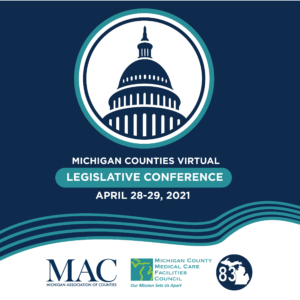 The top two leaders for the National Association of Counties (NACo) will provide a special briefing on the American Rescue Plan (ARP) and the $65.1 billion in direct aid to U.S. counties during an April 29 Plenary session of the 2021 Michigan Counties Legislative Conference.
The top two leaders for the National Association of Counties (NACo) will provide a special briefing on the American Rescue Plan (ARP) and the $65.1 billion in direct aid to U.S. counties during an April 29 Plenary session of the 2021 Michigan Counties Legislative Conference.
NACo President Gary Moore of Boone County, Ky., and CEO/Executive Director Matt Chase will discuss the ARP and NACo’s targeted strategy for the implementation of this once-in-a-lifetime investment in county government.
This is just one of several plenary and workshop sessions that will provide practical information on issues of urgency to Michigan county leaders.
The conference is just three weeks away now. County officials are urged to register by April 14 to get the best rate for the two-day event.
Remember, all conference events are included in your single conference fee, which is now just $100 if you are a member of MAC or the Michigan County Medical Care Facilities Council.
MAC joins coalition on housing affordability
 MAC recently joined a diverse group of entities to form the Housing Michigan Coalition. The coalition consists of community, business and government organizations that support increasing housing supply and affordability.
MAC recently joined a diverse group of entities to form the Housing Michigan Coalition. The coalition consists of community, business and government organizations that support increasing housing supply and affordability.
The coalition’s primary focus will be to advocate for legislation creating and expanding tools for local governments to support the development or rehabilitation of housing supply that is attainable to more of our citizens.
Legislation is being crafted to:
- Allow municipalities to develop payment in lieu of taxes agreement with developers who are building or rehabbing affordable housing units
- Provide employers who contribute towards the housing of employees that make up to 120 percent of AMI (area median income) an income tax credit up to 50 percent of the total eligible contributions
- Authorize an “attainable housing district” where property owners can apply for partial tax exemptions if they meet certain affordability criteria determined by the local government
A full list of the drafted proposed legislation can be found here.
MAC expects bills to be introduced next week when the Legislature returns to Lansing.
Governor creates Task Force on Forensic Science
 A new Executive Order from Gov. Gretchen Whitmer creates a Task Force on Forensic Science “to study issues related to forensic science and provide recommendations to strengthen the use of forensic science in Michigan’s criminal justice system.”
A new Executive Order from Gov. Gretchen Whitmer creates a Task Force on Forensic Science “to study issues related to forensic science and provide recommendations to strengthen the use of forensic science in Michigan’s criminal justice system.”
The task force will be an advisory body under the Michigan Department of State Police and be comprised of medical practitioners, legal professionals, government officials, academics and private sector experts. Co-chairs of the task force will be Director Col. Joseph Gasper of the Michigan State Police and Chief Justice Bridget Mary McCormack of the Michigan Supreme Court.
The task force’s mission is to review the state of forensic science in Michigan and deliver their completed findings and policy recommendations to the governor no later than Dec. 31, 2021. The findings will recommend, among other pieces, methodology improvements, processes to address misconduct and procedures to update stakeholders on developments in forensic science.
A list of current members can be found here.
Deadline approaches on Hometown Health award nominations
 The Michigan Public Health Week Partnership is still seeking nominations of individuals and organizations that have made significant contributions to preserve and improve their community’s health for its annual Hometown Health Hero awards.
The Michigan Public Health Week Partnership is still seeking nominations of individuals and organizations that have made significant contributions to preserve and improve their community’s health for its annual Hometown Health Hero awards.
Deadline for nominations is April 26.
Hometown Health Hero awards are presented every spring as part of Michigan Public Health Week.
Nomination forms can be downloaded from www.michigan.gov/mphw. Completed nominations should be sent to Jim Koval via email at kovalj@michigan.gov or faxed to 517-335-8392.
Winners will be announced by the week of May 9, which will be Public Health in Michigan Week.
Redistricting Commission sets public hearings for May, June
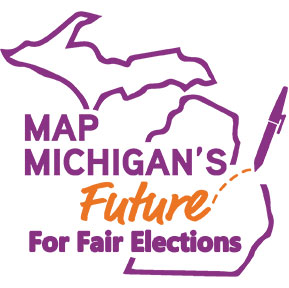 The Michigan Independent Citizens Redistricting Commission (MICRC) has set its first series of public hearings for its work to redraw political lines for the 2022 elections.
The Michigan Independent Citizens Redistricting Commission (MICRC) has set its first series of public hearings for its work to redraw political lines for the 2022 elections.
The public hearings will run from 5 p.m. to 9 p.m. and are currently set for virtual sessions, though that is subject to change as the pandemic health orders change. Locations and dates are:
- May 11 – Jackson
- May 13 – Kalamazoo
- May 18 – Marquette
- May 20 – Gaylord
- May 25 – Midland
- May 27 – Lansing
- June 1 – Flint
- June 3 – Pontiac
- June 8 – Novi
- June 10 – Dearborn
- June 15 & 17 – Detroit
- June 22 – Port Huron
- June 24 – Warren
- June 29 – Muskegon
- July 1 – Grand Rapids
Please note, the Independent Redistricting Commission will draw district lines for state legislative and federal congressional districts. The lines for county commissioner districts are handled by county Apportionment Boards. For details on the apportionment process, click here or attend a special workshop at the 2021 Michigan Counties Legislative Conference.
 Staff picks
Staff picks
- Upper Peninsula Energy Task Force Recommendations (Department of Environment, Great Lakes and Energy)
- How states can help localities better respond to pandemic-related fiscal strains (Pew Trusts)
- States tap federal CARES Act to expand broadband (Pew Trusts)
- Suez Canal: How did they move the Ever Given? (BBC News)







